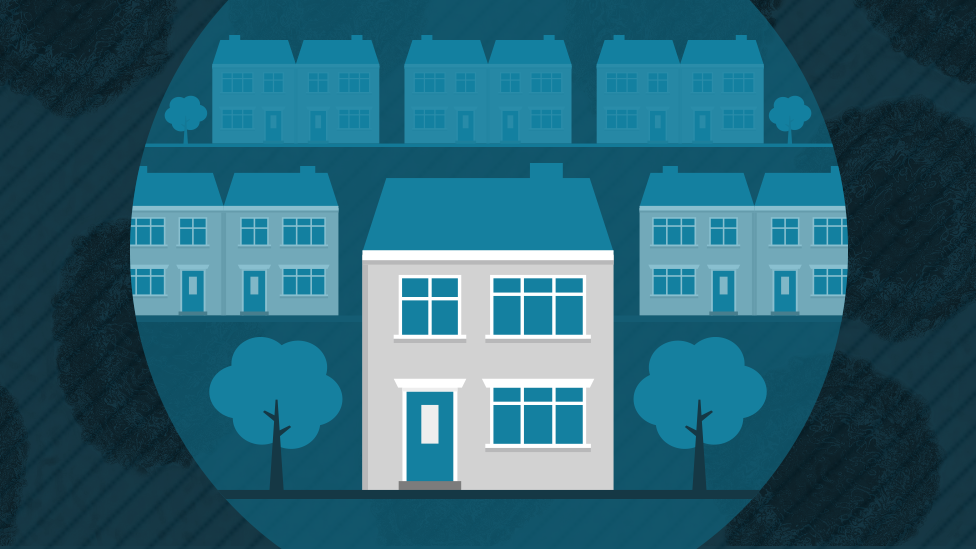Coronavirus: Minimum fine for Covid law breach to rise to £200
- Published
- comments
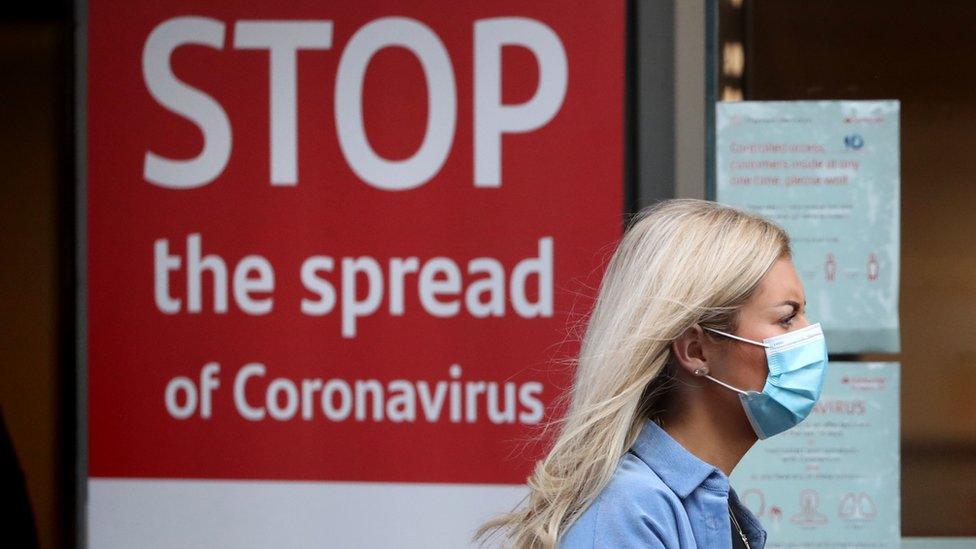
The use of mandatory face coverings in Northern Ireland is also to be extended
People in Northern Ireland caught breaching coronavirus regulations will now face a minimum fine of £200 under plans agreed by the executive.
Thursday's meeting saw ministers sign off on proposals brought by Justice Minister Naomi Long.
At present, fixed penalty notices start at £60, but can rise to £960 for repeat offenders.
First Minister Arlene Foster also confirmed that the use of mandatory face coverings in NI is to be extended.
Face coverings are already compulsory on public transport and for customers in shops, but will now become mandatory in the following settings:
Taxis and private buses
For staff in retail shops
In public areas of civil services offices such as jobs and benefits offices
When boarding a plane
In banks, building societies, credit unions and post offices
For driving instructors and their students
The usual exemptions from wearing a face covering will still apply, the executive has said.
Mrs Foster told a press briefing at Stormont that there would be a "new regime" of penalties to strengthen existing measures to try and curb the spread of Covid-19.
"The consequences from today will be more serious," she said.
"I'm saying to everyone - how far and how hard the executive will have to go depends on your actions today, tomorrow, over the weekend and the week ahead."
The executive has also agreed to introduce three new offences: not closing a business as required, breaching closing times and not implementing social distancing.
Breaches will incur a fixed penalty notice of £1,000, or up to £10,000 on conviction.
The justice minister told BBC News NI's The View that "encouragement, engagement and explanation can work".
"But we're also clear that enforcement matters," said Naomi Long.
"There will be those who defy the law, who refuse to take it seriously and enforcement has to follow.
"But that enforcement is going to be the last of the four options we have available to us."
No new local restrictions
A further 923 confirmed cases of Covid-19 were reported by the Department of Health on Thursday. In the last seven days, 4,674 people in Northern Ireland have tested positive.
The department also confirmed the death of another person who died following a positive test, bringing its death toll to 587.
There are 120 people with Covid-19 in hospital - 15 are in intensive care.
Despite speculation, the executive has agreed not to impose new local restrictions in the Newry, Mourne and Down or Belfast council areas, where cases have been rising sharply in recent days.
Mrs Foster said the executive had been advised that "the growth of infections has been blunted" in those areas, while Deputy First Minister Michelle O'Neill said the executive was keeping that decision "under review".
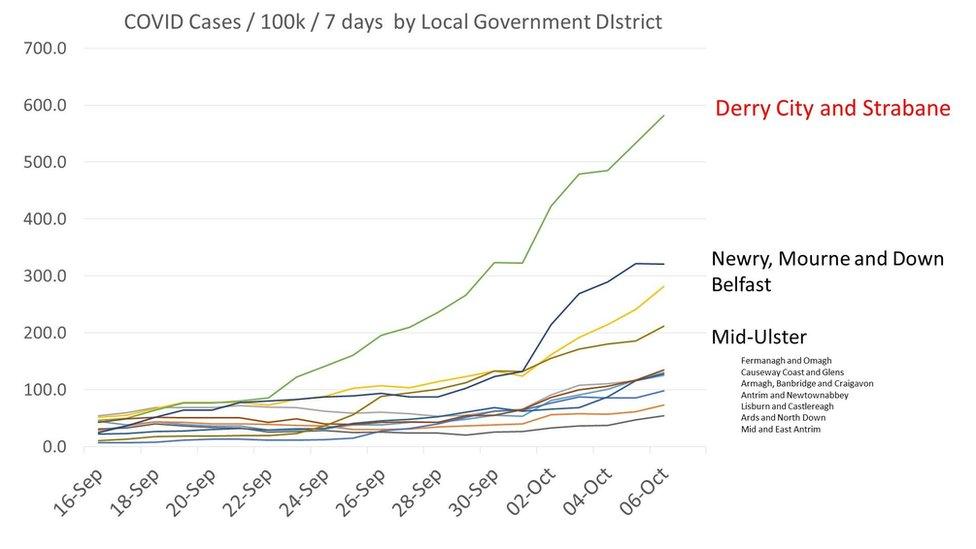
The Department of Health used this slide at their briefing on Wednesday to show case rates across Northern Ireland
She added that the executive is "united" in its decision to ask for additional financial support from the British government to take further action to tackle the virus.
"It is clear the executive is fast approaching a point on making significant difficult decisions that will help us arrest the rise in infections," she said.
Ms O'Neill said ministers would not take any decisions lightly, and that they would try to maintain the "balanced approach" regarding saving people's lives and their livelihoods.
She and Mrs Foster have asked for "an urgent conversation" with Mr Johnson due to cases rising "at an alarming rate".
Allow X content?
This article contains content provided by X. We ask for your permission before anything is loaded, as they may be using cookies and other technologies. You may want to read X’s cookie policy, external and privacy policy, external before accepting. To view this content choose ‘accept and continue’.
Earlier, Taoiseach (Irish PM) Micheál Martin and Prime Minister Boris Johnson expressed concerns about the situation in Northern Ireland.
The two leaders spoke by phone on Thursday morning.
Mr Martin said that he told Mr Johnson that the situation in Northern Ireland was "very, very worrying in terms of the growing numbers" of positive cases.
The taoiseach added that the Northern Ireland Executive "needed support" and he asked Mr Johnson to "give consideration in terms of financial support to underpin any efforts or any restrictions that they themselves might decide to bring in".
According to an Irish government spokesperson, Mr Johnson also raised concerns about the impact of "restrictions on the economy".
The two leaders agreed to monitor the situation and remain in touch.
Half-term circuit breaker?
On Wednesday, Northern Ireland Chief Scientific Adviser Prof Ian Young said of the coronavirus clusters identified, more than half of them had been linked to the hospitality sector.
Stormont ministers have not ruled out bringing in a circuit breaker over the half-term holidays, if localised restrictions do not help to halt the rise in infections.
A circuit breaker is a lockdown for a short period of time, possibly two weeks, to slow the spread of the virus.
It would likely see all pubs and restaurants in Northern Ireland forced to close for the two weeks.
But Economy Minister Diane Dodds said it would only be viable with additional financial support from Westminster.
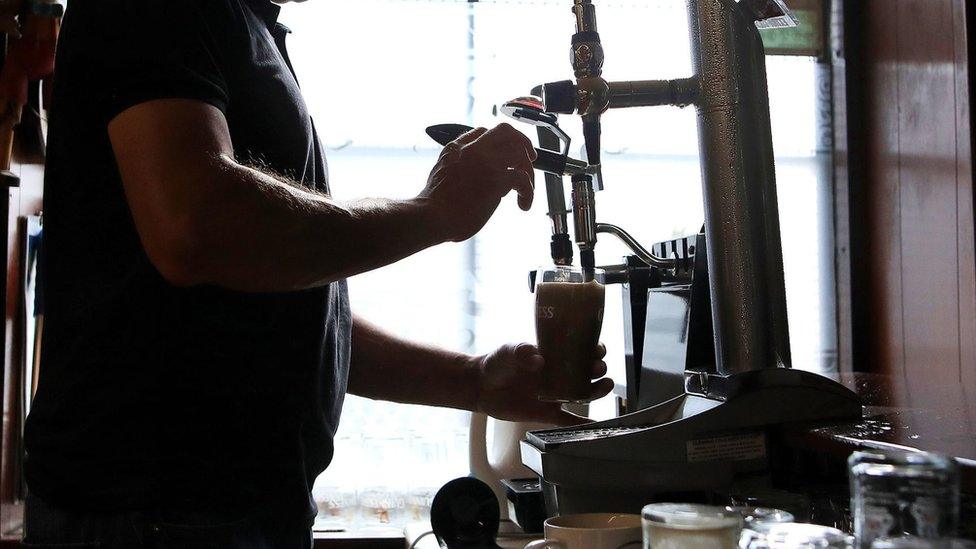
Drinks only bars only reopened on 23 September after nearly six months of closure
It is thought there could be further announcements next week from the Treasury about providing support to the hospitality industry in the worst hit areas of England, where pub closures are being explored.
That could automatically lead to some extra funding for Northern Ireland through what is known as a Barnett consequential.
'Dramatic changes'
Meanwhile, figures obtained by BBC News NI show there are almost 1,200 health care staff off work as a result of coronavirus in Northern Ireland - either self-isolating or directly affected by the virus.
The highest figure was recorded in the Western Trust area, which runs Altnagelvin Hospital in Londonderry, where 386 staff are isolating.
In Belfast, the figure is at least 384, while there is a further 193 staff affected at the Southern Trust, 117 in the South Eastern Trust and 116 at the Northern Trust.
At the Northern Ireland Ambulance Service (NIAS), 68 people are off work.
The interim chief executive of the South Eastern Health Trust, Seamus McGoran, said now is "a critical time" for the NHS and the public.
"It feels rather like March, when we were not really in the foothills of the surge, but one third to half way up the mountain," he said.
"Unless we make dramatic changes to our behaviours within the community, we're going to be exactly where we were in about two to three weeks' time."
- Published8 October 2020

- Published7 October 2020
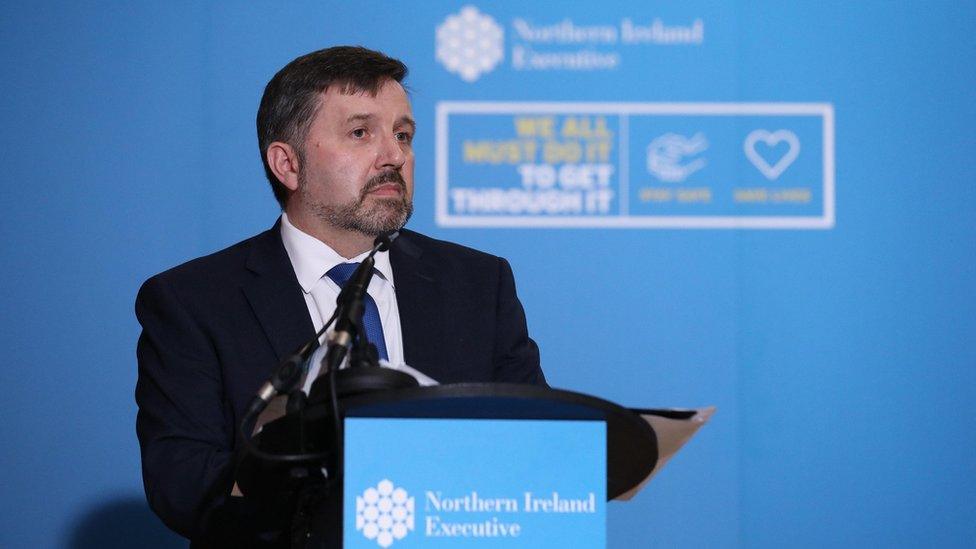
- Published26 January 2022
